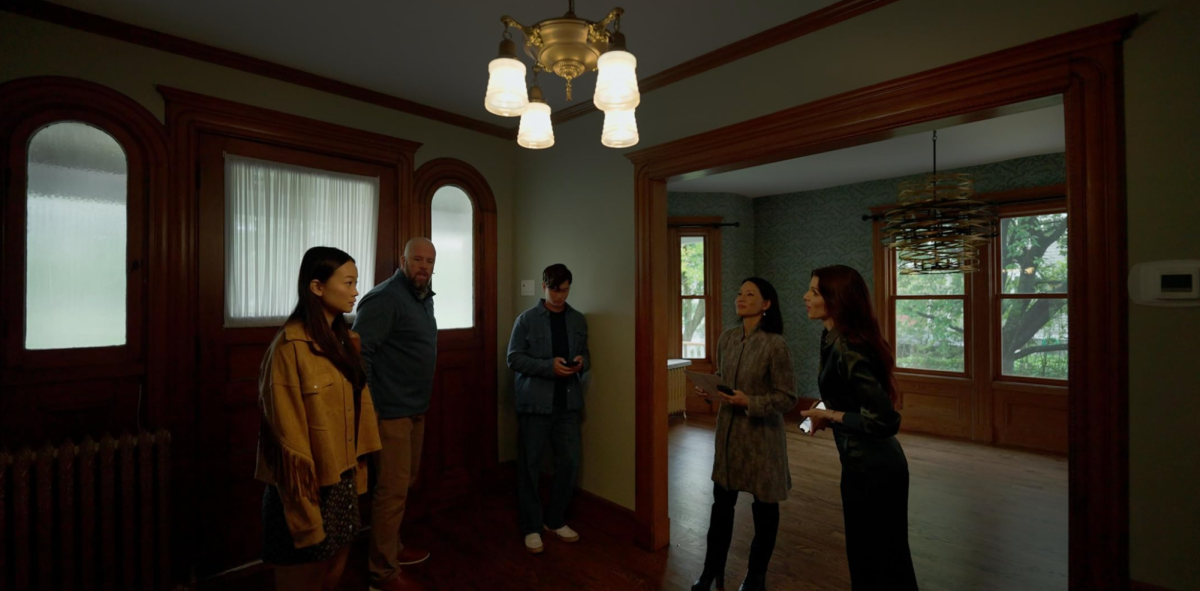
IMDB

Although advertised as a haunting new addition to the horror genre, the scariest part of “Presence” might be the incestuous vibe of the relationship between Tyler Payne (Eddy Maday) and his mother, Rebecca (Lucy Liu). Rebecca’s obsession with her son and his promising swim career is what sparks her decision to move her family to a new school district after an unfortunate tragedy befalls them. Unbeknownst to the Paynes, the 100-year-old house they buy is already inhabited by some supernatural presence that seems caught between worlds.
It is through the first-person point of view of this ‘presence’ that the film — better described as a familial drama with a tinge of the supernatural than an actual horror movie — is shot. Through the eyes of the ghost, the audience takes on an eerily voyeuristic role, watching as the family navigates their day-to-day lives under the increasing strain of their tense relationships. The examination through this lens offers an interesting critique of a heavily caricatured typical American family. For example, Rebecca is so caught up in her work that she ignores her family, causing her marriage to Chris (Chris Sullivan) to crumble and her relationship with their daughter, Chloe (Callina Liang), to disintegrate. Tyler’s preoccupation with popularity leads to outright nastiness toward his grieving sister, while his friendship with a popular peer, Ryan (West Mulholland), highlights how disgusting personalities can often be so well-liked by society. Chris tries to be present for his children, but their struggle to function as a unit ultimately shines through in details like their amassing food delivery fees and the implosion of every conversation at the dinner table.
Despite the intrigue of the characters’ relationships, there is little reason to feel any connection toward each of their hardly fleshed-out and frankly infuriating personalities; due to this the climax feels rather hollow. Furthermore, the addition of a secondary character, a psychic who hints at the ghost’s identity well before the climactic ending, was utterly unnecessary. Without this contrived addition, the reveal would have demanded a reconsideration of the motive behind some of the ghost’s so-called haunting of the family and might even have drastically increased the movie’s pathos.
Even more unfortunately, any potential for poignancy is ruined by the comically cringe-worthy dialogue. Given the clunkiness of their lines, Liu and Sullivan offer decent performances as the parents, with Liu truly shining with raw emotion in the last five minutes of the film. Liang is tremendous in her role as Chloe, though the lackluster script stunts her performance as it sounds like it was written by someone who has never heard a teenager speak. Watching Maday, whose eyes are glazed over with a perpetually confused stare, reminded me of watching my younger sister’s fourth-grade class butcher their performance of “Little Nicholas.” His stumbling delivery cannot even be attributed to the misfortune of having received the absolute worst lines, though, since Mulholland has him beat in that domain. Every scene where his character, Ryan, interacts with either Tyler or Chloe feels physically painful. The most redeemable performance is probably Julia Fox, who as a real estate agent solid five minutes of screen time at the beginning of the movie.
The concept of the film was experimental and fascinating; had it been executed in such a way that it did not completely detract from the movie’s advertised fear factor or overall quality, it might have been revolutionary. The confinement of the ghost to the house, the palpable confusion and even fear of this spirit unsure of its place in the world and the slow-burning discovery of its connection to the family had the potential to be riveting. However, the movie manages to miss that mark completely. The perspective is interesting until it feels as if the ghost is chasing after characters only so the audience can witness their reactions, at which point it becomes laughable. Frequent cuts to black last just long enough to feel unnatural and take the audience out of the story. The piercing stares of the few characters capable of seeing beyond the veil are generally well-used yet feel almost accidental. Overall, the film lacks the intentionality to truly reach the heights it was attempting to climb.
Fortunately, the movie does not overstay its welcome. Had it continued even a minute longer than its 85-minute runtime, it would have been unbearable, but the story is resolved shortly and sweetly. “Presence” might not take the crown for the scariest movie of the year, but no movie has come remotely close to inspiring the same feeling of sheer perplexion I experienced as soon as “Covet” by Basement started playing mid-climactic incident.